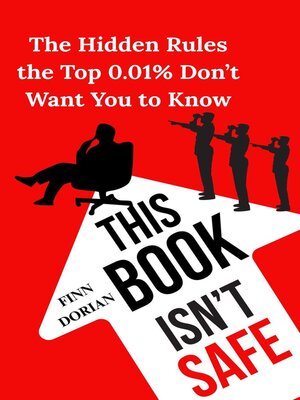
Sign up to save your library
With an OverDrive account, you can save your favorite libraries for at-a-glance information about availability. Find out more about OverDrive accounts.
Find this title in Libby, the library reading app by OverDrive.



Search for a digital library with this title
Title found at these libraries:
| Library Name | Distance |
|---|---|
| Loading... |
There's a reason the most powerful people on earth don't write books. They write contracts. They fund schools. They rewrite history. But they don't hand out manuals. They don't teach you how the real game works—because they don't need more players. They need spectators. And that's exactly what you've been trained to be.
This book wasn't written to entertain you. It was written to offend every blueprint you were handed. The classroom lectures. The career ladder. The dream of owning a home in a neighborhood that's been priced out of reach by people who don't even live in the country. This Book Isn't Safe doesn't belong in a polite conversation, and it sure as hell doesn't belong on your bookshelf next to personal development fantasies. It belongs in your hands, when you're done pretending that playing nice is getting you anywhere.
If you're still believing in meritocracy, stop reading now. Because this book will ruin it for you. It will show you why performance doesn't equal power. Why working hard means nothing if you're working inside a rigged frame. Why the winners aren't competing—they're extracting. They don't hustle. They structure. They don't create value—they acquire leverage. They aren't in the game. They own the field. And while the world argues over politics, identity, and ethics, they're sitting above the noise—monetizing your outrage, weaponizing your hope, and turning your belief in fairness into their asset.
The hidden rules aren't just economic. They're psychological. They've built systems that reward compliance and punish pattern recognition. You're taught to fear risk, to praise stability, to borrow for status and starve for prestige. You're incentivized to spend your prime years in cubicles, cubicles wrapped in slogans about purpose and teamwork—while the real decision-makers diversify, restructure, and disappear behind legal shields. And when the system cracks, they don't lose. They pivot. The rest? Left holding bags of debt, diplomas, and regrets.
What this book delivers isn't inspiration. It's weaponization. Inside, you'll dissect the decision-making frameworks the elite use to control outcomes. You'll learn how to read what they don't say in public filings, how to smell control behind philanthropy, and how to recognize the architecture of true autonomy—offshore entities, second passports, controlled assets, media proxies, capital insulation, tax choreography.
This book won't teach you how to make six figures. That's bait. It teaches you how to operate in a world where wealth isn't made—it's positioned. Where power isn't taken—it's transferred through silence, timing, and optics. Where access, not effort, is the currency that runs everything from policy to platforms. If you want to know why some people can tweet the truth and vanish, while others can lie and expand their empires, this is where it begins.
Inside these pages, you'll study the real frameworks: how regulatory loopholes are pre-purchased through lobbying before laws are passed; how scarcity is manufactured by design, not accident; how hedge fund managers create narrative risk to manipulate public perception of assets; how media is used to create controlled collapse and artificial rebounds for predictable entry points. And most of all—how to opt out of being a pawn and start building moves like a ghost.
You'll learn why the top 0.01% don't need to beat the system—they wrote it. You'll see why ownership is always hidden behind layers, why influence flows through proxies, and why anyone talking about "legacy" in public is probably hiding their real strategy in trusts, shells,...







